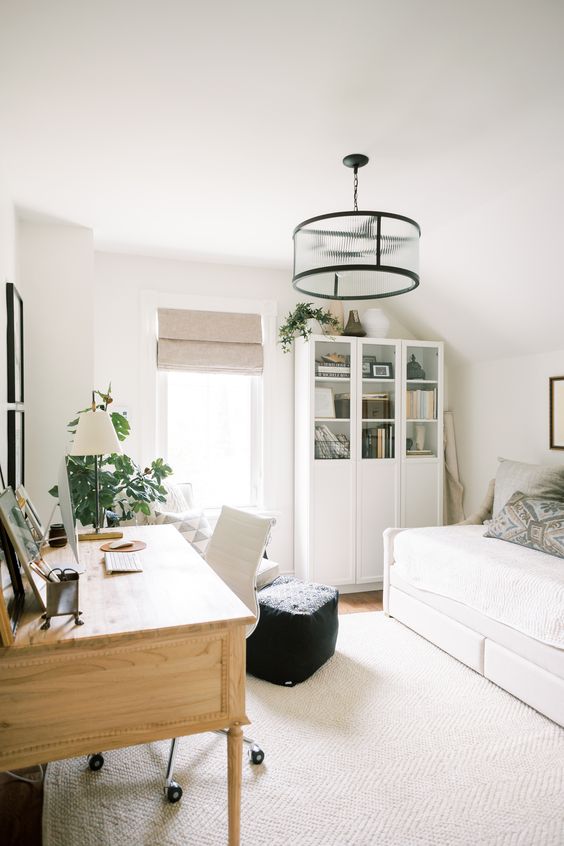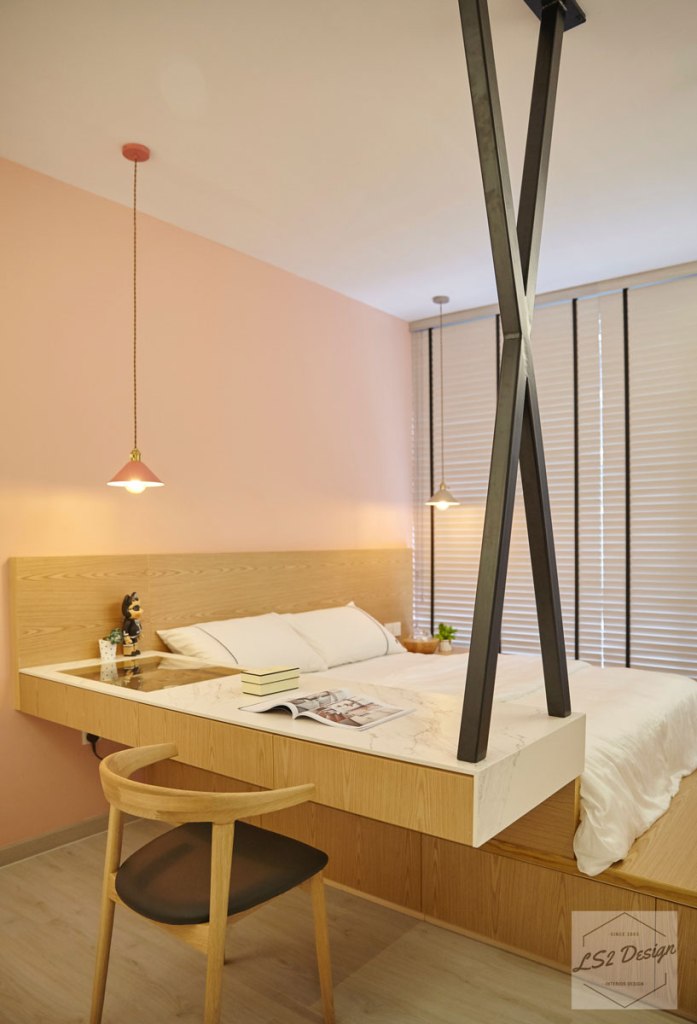In our increasingly digital world, more of us are working from home than ever before. While the idea of a home office is appealing, not everyone has the luxury of a dedicated workspace. Many of us must find a way to blend work and personal life within the confines of our bedrooms. This article will guide you through four essential tips for creating a functional bedroom office that enhances productivity while maintaining a comfortable living space.

Photo by: nextluxury.com
1. Choose the Right Location
The first step in establishing a functional bedroom office is selecting the ideal location. Consider the following factors when determining the best spot:
a. Natural Light
Natural light has a significant impact on productivity and mood, so try to position your desk near a window, if possible. This will not only reduce eye strain but also create a pleasant ambiance. If natural light is limited, consider using full-spectrum light bulbs to mimic daylight.
b. Avoid Distractions
Select a location that minimizes distractions. If your bedroom is shared with a partner or family members, communicate your need for quiet during work hours. Avoid areas close to the bed, as the temptation to relax can lead to decreased productivity. Instead, aim for a corner or nook that feels separate from your sleeping space.
c. Privacy
If your bedroom is also a living space, ensure that your workspace feels private. Use room dividers, curtains, or screens to separate your office from the rest of the room. This will help you mentally transition from “home mode” to “work mode,” allowing you to focus better on your tasks.

Photo by: www.shelterness.com
2. Invest in Functional Furniture
Creating a functional bedroom office hinges on having the right furniture. It’s essential to choose pieces that optimize your space and support your work habits.
a. Ergonomic Chair and Desk
Invest in a comfortable, ergonomic chair that provides proper lumbar support. A desk that suits your height and fits your workspace is equally important. If space is limited, consider a compact desk or a wall-mounted option that can be folded away when not in use.
b. Multitasking Furniture
Look for furniture that can serve multiple purposes. For instance, a desk with built-in storage can help keep your workspace organized while doubling as a nightstand. You could also consider a pull-out desk that can be tucked away when not in use, freeing up space in your bedroom.
c. Cable Management Solutions
With the number of devices we use, managing cables can be a challenge. Invest in cable management solutions like clips, sleeves, or boxes to keep your workspace tidy. This not only enhances aesthetics but also minimizes distractions caused by clutter.

Photo by: onekindesign.com
3. Create a Productive Atmosphere
The overall atmosphere of your bedroom office plays a crucial role in your productivity. Here are some tips to create an environment that fosters focus and creativity:
a. Personalize Your Space
Incorporate personal touches to make your workspace inviting. Hang artwork, add plants, or display motivational quotes that inspire you. A personalized workspace helps you feel more connected to your environment and can boost your mood.
b. Organize Your Supplies
An organized workspace is essential for productivity. Use desk organizers, shelves, or storage boxes to keep supplies within reach but out of sight. A clutter-free desk will allow you to focus better and reduce stress.
c. Consider Color Psychology
Colors can affect mood and productivity. Choose a color palette that resonates with you and enhances your work performance. For example, blue is known to promote calmness and focus, while yellow can inspire creativity. Opt for shades that complement your bedroom decor while fostering a productive mindset.

Photo by: www.shelterness.com
4. Establish Boundaries
When working from a bedroom office, it’s crucial to establish boundaries between work and personal life. Here are some strategies to help you maintain that balance:
a. Set a Schedule
Create a daily work schedule that outlines your working hours. This helps you mentally prepare for the day ahead and signals to others that you are unavailable during those times. Stick to your schedule as much as possible to maintain a healthy work-life balance.
b. Designate a “Work Mode”
When you enter your bedroom office, switch to “work mode” by implementing specific rituals. This could be as simple as changing into work clothes, lighting a candle, or playing background music. These small actions can help signal to your brain that it’s time to focus.
c. Communicate with Housemates
If you share your living space, communicate your work schedule with housemates or family members. Make it clear when you need uninterrupted time to work, and encourage them to respect those boundaries.

Photo by: www.houszed.com
Conclusion
Creating a functional bedroom office is not only about finding a suitable workspace; it’s about optimizing that space to enhance productivity and comfort. By choosing the right location, investing in functional furniture, curating a productive atmosphere, and establishing boundaries, you can successfully blend your work and personal life without sacrificing either. With these tips, you’ll be well on your way to achieving a harmonious and productive work-from-home experience.

Photo by: www.shelterness.com
Frequently Asked Questions (FAQ)
1. How can I make my bedroom office more comfortable?
To make your bedroom office more comfortable, invest in an ergonomic chair and desk that suit your needs. Incorporate personal touches like artwork and plants, and ensure your workspace is well-lit with natural or good-quality artificial light.
2. Is it necessary to have a separate office in my bedroom?
While a separate office space is ideal, it’s not necessary. Many people successfully work from their bedrooms by optimizing the space and creating a designated workspace that separates work from rest.
3. How can I minimize distractions while working in my bedroom?
To minimize distractions, choose a quiet location in your bedroom away from the bed. Use noise-canceling headphones if necessary, and communicate your work hours to others in your home.

Photo by: nextluxury.com
4. What furniture should I consider for a bedroom office?
Consider investing in an ergonomic chair and desk that fit your space. You may also want to look for multitasking furniture, such as a desk with storage or a foldable desk, to maximize your space efficiency.
5. How do I maintain work-life balance when working from home?
Establish a clear work schedule, designate a “work mode,” and communicate your boundaries with housemates. This will help you separate your work life from your personal life, leading to a healthier balance.
By following these tips, you can create a bedroom office that not only meets your work needs but also enhances your living space. Happy working!
